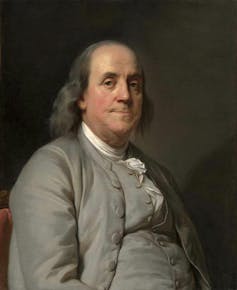Need for deterrence
One of the founders’ greatest fears was that the president would abuse his power. George Mason described the president as the “man who can commit the most extensive injustice.”
James Madison thought the president might “pervert his administration into a scheme of stealing public funds or oppression or betray his trust to foreign powers.” Edmund Randolph, governor of Virginia, said the president “will have great opportunitys of abusing his power; particularly in time of war when the military force, and in some respects the public money will be in his hands.”
Gouverneur Morris of Pennsylvania worried that the president “may be bribed by a greater interest to betray his trust and no one would say that we ought to expose ourselves to the danger of seeing him in foreign pay.” James Madison, himself a future president, said that in the case of the president, “corruption was within the compass of probable events … and might be fatal to the Republic.”
William Davie of North Carolina argued that impeachment was “an essential security for the good behaviour” of the president; otherwise, “he will spare no efforts or means whatever to get himself re-elected.” Elbridge Gerry of Massachusetts pointed out that a good president will not worry about impeachment, but a “bad one ought to be kept in fear.”
Creating a powerful oversight procedure
Until the very last week of the convention, the founders’ design was for the impeachment process to start in the House of Representatives and conclude with trial in the Supreme Court.
It was not until Sept. 8, 1787, that the convention voted to give the Senate instead the power to conduct impeachment trials.
This is clear evidence that the convention at first wanted to combine the authority and resources of the House of Representatives to conduct the impeachment investigation – a body they called “the grand Inquest of this Nation” – with the fairness and power exemplified by trial in a court.
Even though trial of impeachments was moved from the Supreme Court to the Senate, Congress can still draw on the example of court procedures to accomplish an effective inquiry, especially if they are trying to get information from uncooperative subjects. In many of the investigations that are now part of the House’s impeachment inquiry, the Trump administration has refused to hand over documents and blocked officials from testifying to Congress.
The Constitution makes clear that impeachment is not a criminal prosecution: “Judgment in cases of impeachment shall not extend further than to removal from office.”
If impeachment trials had remained at the Supreme Court, the court could therefore have consulted the rules it has approved for civil cases. It makes sense that when the convention at the last minute decided Congress would have complete power over impeachment, the delegates intended Congress would have at least the same powers the Supreme Court would have exercised.
When courts are stonewalled
In civil cases, courts have powerful tools for dealing with someone who blocks access to the very information needed to judge the allegations against him.
The most commonly known method is the rule that says that once a person is legally served with a lawsuit against them, they must respond to the complaint. If they don’t, the court can enter a judgment against them based on the allegations in the complaint. But there are other processes as well.
One court tool that could easily be adapted to the impeachment process comes from the federal rules of civil procedure. In a process called “request for admission,” one party to a lawsuit can give their opponents a list of detailed factual allegations with a demand for a response.
If the party does not respond, the court can treat each allegation as if it were true, and proceed accordingly. If the respondent denies one or more particular allegations, there is a follow-up procedure called a request for production, demanding any documents in their possession or control supporting the denial. If the respondent refuses, again the court has the power to order that the alleged fact be taken as true.

Benjamin Franklin of Pennsylvania.
Joseph Duplessis/National Portrait Gallery/Wikimedia Commons
Good for the president and the country
Benjamin Franklin told his fellow delegates the story of a recent dispute that had greatly troubled the Dutch Republic.
One of the Dutch leaders, William V, the Prince of Orange, was suspected to have secretly sabotaged a critical alliance with France. The Dutch had no impeachment process and thus no way to conduct “a regular examination” of these allegations. These suspicions mounted, giving rise to “the most violent animosities & contentions.”
The moral to Franklin’s story? If Prince William had “been impeachable, a regular & peaceable inquiry would have taken place.” The prince would, “if guilty, have been duly punished – if innocent, restored to the confidence of the public.”
Franklin concluded that impeachment was a process that could be “favorable” to the president, saying it is the best way to provide for “the regular punishment of the Executive when his misconduct should deserve it and for his honorable acquittal when he should be unjustly accused.”
Editor’s note: This is an updated version of an article originally published Sept. 26, 2019.

Clark D. Cunningham does not work for, consult, own shares in or receive funding from any company or organization that would benefit from this article, and has disclosed no relevant affiliations beyond their academic appointment.

 Trump has begun another trade war. Here's a timeline of how we got here
Trump has begun another trade war. Here's a timeline of how we got here
 Canada's leader laments lost friendship with US in town that sheltered stranded Americans after 9/11
Canada's leader laments lost friendship with US in town that sheltered stranded Americans after 9/11
 Chinese EV giant BYD's fourth-quarter profit leaps 73%
Chinese EV giant BYD's fourth-quarter profit leaps 73%
 You're an American in another land? Prepare to talk about the why and how of Trump 2.0
You're an American in another land? Prepare to talk about the why and how of Trump 2.0
 Chalk talk: Star power, top teams and No. 5 seeds headline the women's March Madness Sweet 16
Chalk talk: Star power, top teams and No. 5 seeds headline the women's March Madness Sweet 16
 Purdue returns to Sweet 16 with 76-62 win over McNeese in March Madness
Purdue returns to Sweet 16 with 76-62 win over McNeese in March Madness







